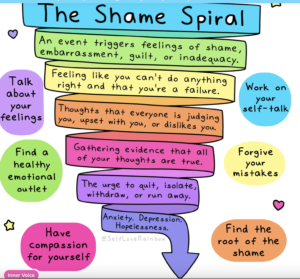 As children, we see ourselves in the eyes of those we love and respect.
As children, we see ourselves in the eyes of those we love and respect.
Shame often begins in childhood through experiences with parents, siblings, peers and others.
Children are susceptible to feedback and learn at a very young age what behaviors elicit praise or disapproval from others. Repeated experiences of embarrassment, rejection, humiliation or/and disapproval can become internalized, shaping a child’s self-concept and belief systems.
These experiences may not be remembered consciously, but they are internalized in the unconscious, and may surface as anxiety, for example.
Shame can lead to low self-esteem, anxiety, depression, people-pleasing behaviors and difficulty forming secure relationships mainly because they fear to show themselves authentically and not be accepted.
Many people with high levels of shame see themselves as “defective”, not “good enough” or “less than” compared to others. This colors how they view themselves and the world, limiting what they feel capable of and deserving of.
Shame can also cause people to isolate themselves, avoid social interactions and withdraw from activities that bring them joy. The fear of judgment and disapproval prevents them from fully engaging with life. Over time, shame saps motivation and energy, leaving a person feeling stuck and powerless to change.
Shame is detrimental to our lives because it involves feeling bad about who we are as a whole person. Shame says “I am bad”, not “what I did was bad.”
When we feel shame, we see our whole self in a negative light. Shame often involves feeling exposed, defective or inadequate in front of others. We feel the need to hide or withdraw when experiencing shame.
With self-awareness, however, shame can be recognized, and with tools and support, people can overcome shame and reclaim their inherent self-worth.
The first step is recognizing how shame operates and is triggered. Then, people can challenge their core shame-based thoughts and beliefs that no longer serve them. They can also learn how to meet their core emotional needs in healthier ways.
Practicing self-compassion is key, and reframing past experiences can also help overcome shame over time. Seeing one’s perceived “flaws” as simply part of the human experience allows space for growth and change.
With support, we can all reclaim our sense of self, expand our identities beyond shame and move forward in life with renewed confidence. Transformation is possible.
Hello,
Do you teach a course on how to recognize how shame operates and is triggered, challenging core shame-based thoughts and beliefs that no longer serve me and practicing self compassion to meet my core emotional needs in healthier ways?
Thank you for your interest, Peter. I do offer a course called Inner Healing Circle, which covers topics related to Shame. I invite you to read the description and see if this is what you are looking for. Here’s the link:https://embracemindfulness.org/inner-healing-circle/
I also offer private sessions via Zoom, and if you are interested in learning more, I offer a preliminary free phone call to find out if they would work for you. Here’s the page, the description and some of the testimonies: https://embracemindfulness.org/private-mindfulness-sessions/
It would be a pleasure to support you on your journey.
Warmly,
Monica Jordan
Hi Monica,
I believe in letting people know when they get things right and you do! Your written explainations of the thinking patterns and behaviors we carry, along with from where they stem and how they effect the way we live and relate to ourselves and others are so clear and understandable.
Breaking these things down into the hows and the whys are so impactful. Demystifying the issues we suffer from makes them more accessible. Making sense of a problem and understanding that its “not just you” makes them more solvable. Therapist don’t do what you do, so one can work for extended periods without achieving much change.
I appreciate you and what you do so very much.
Thank you!
Allison